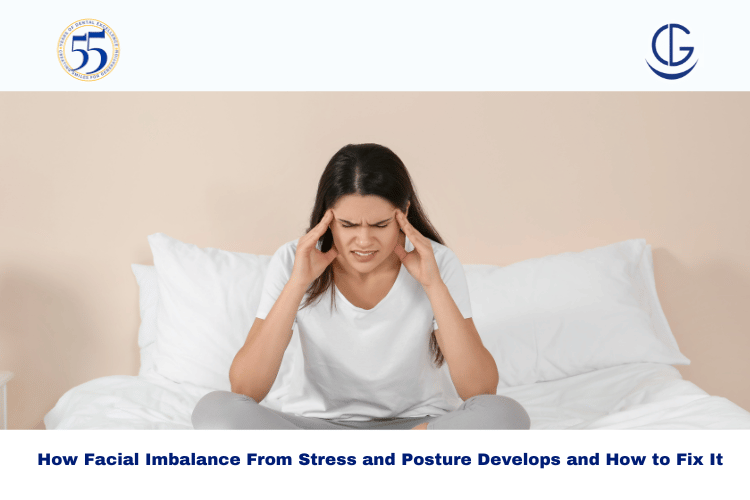Schedule Appointment



At Dr Gowds Dental Hospital in Hyderabad, many patients visit us with concerns about subtle or noticeable changes in their facial symmetry. One of the most common questions we hear is: “Can stress or posture cause facial imbalance?”
The answer is yes—both can play a significant role. Stress affects jaw muscles, while poor posture disrupts your head and neck alignment, ultimately creating or worsening facial imbalance from stress and posture.
If you’re already noticing uneven jaw movement, facial tightness, or mild asymmetry, book your consultation at our Hyderabad clinic today for early evaluation and personalized treatment.
Stress activates your body’s muscle-tension response. When this tension repeatedly targets your jaw and facial muscles, it can lead to:
Many patients experience unconscious jaw clenching during stressful periods. Over time, this constant pressure causes muscle overuse on one side, creating facial imbalance from stress and posture.
Stress often affects one side more than the other. This can cause:
Chronic grinding—or nighttime clenching—can reshape the jaw muscles. This contributes to long-term asymmetry, especially if untreated.
Patients who work long hours at desks often develop poor posture without noticing it.
When the head tilts forward while working:
This misalignment can lead to visible facial imbalance from stress and posture.
Uneven shoulders can pull the jaw joint (TMJ) out of alignment, creating:
Cross-leg sitting, leaning on one elbow, or tilting the head during calls are habits that gradually shape facial muscles unevenly.
Whether you’re stressed or dealing with posture issues, early facial imbalance signs include:
If you notice these signs, early intervention can prevent long-term structural imbalance.
We use a detailed, personalised approach that includes:
Every patient receives a customized diagnosis tailored to their lifestyle, symptoms, and facial structure.
At our clinic, treatment always begins with identifying the root cause.
To reduce tightness and restore balance.
Ideal for those with stress-related clenching or bruxism. This prevents further asymmetry and protects teeth.
To realign the jaw, reduce clicking, and restore symmetry.
Especially helpful for IT professionals in areas like Gachibowli and Hitech City.
We guide patients on:
For advanced asymmetry, we may recommend:
Sometimes—yes. But only if caught early.
Facial imbalance caused by:
…can often improve with targeted exercises, nightguards, and posture correction.
However, long-term imbalance requires professional treatment. This is why early evaluation at a specialized dental clinic like Dr Gowds Dental Hospital is crucial.
Stress and poor posture are two of the most overlooked causes of facial asymmetry. When jaw, neck, and facial muscles are repeatedly strained, the result is often noticeable facial imbalance from stress and posture.
Your facial symmetry is worth protecting.
Yes. Continuous jaw clenching, muscle tension, and uneven facial movement caused by stress can lead to noticeable facial imbalance from stress and posture.
Absolutely. Forward head posture or uneven sitting positions can shift your jaw alignment and create facial asymmetry.
Mild cases caused by temporary stress or posture often improve with exercises and jaw relaxation. Persistent cases require professional treatment.
If you grind or clench, especially at night, a nightguard protects your teeth and prevents worsening asymmetry.
We assess jaw alignment, TMJ function, posture, muscle patterns, and bruxism to create personalized treatment plans for restoring symmetry.